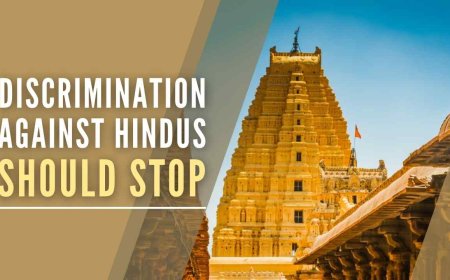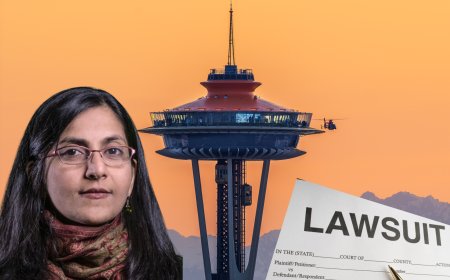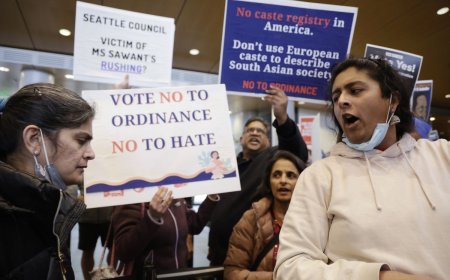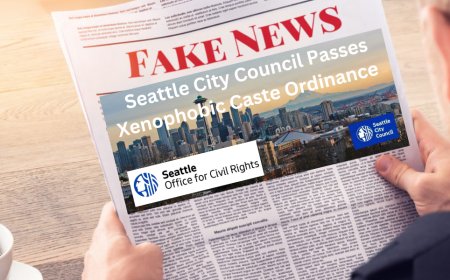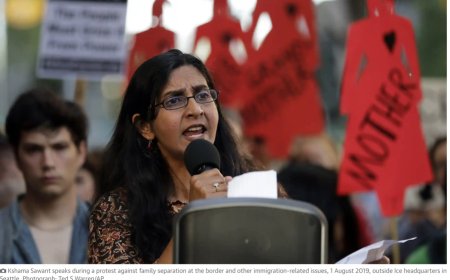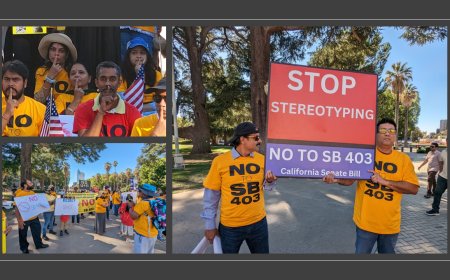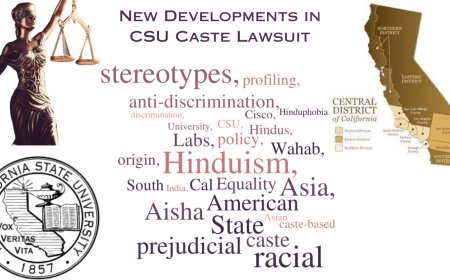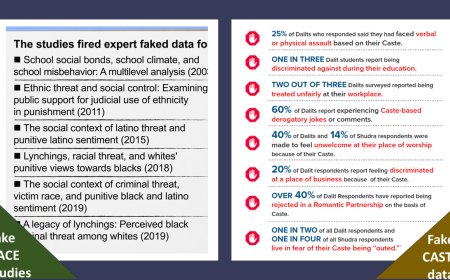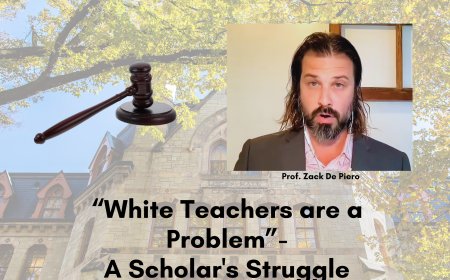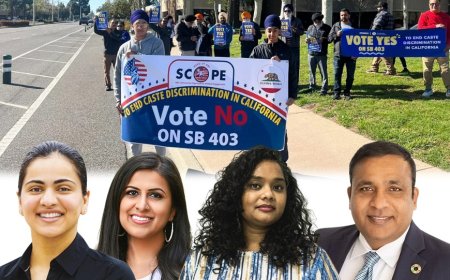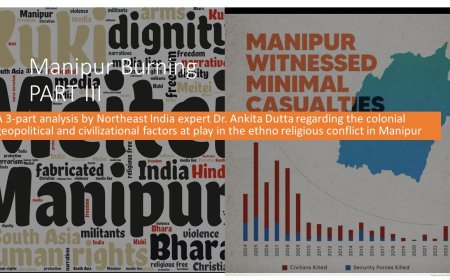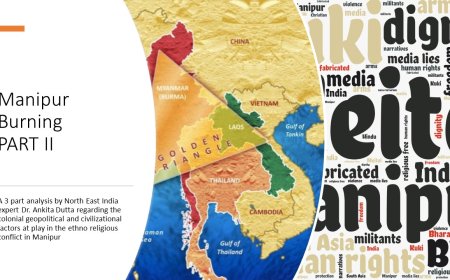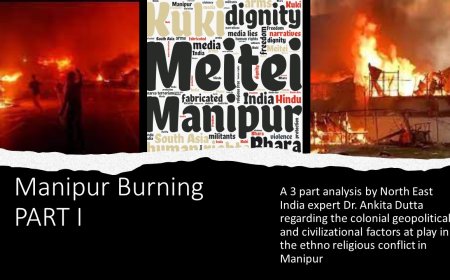Manipur Violence: Narco-Terrorism and the Problem of Illegal Immigration—Part II of a Three-Part Academic Review

Many of today’s conflicts are seeded in caste, tribe, race, and religious identities that helped the "divide et impera" (divide and conquer) colonialists—Northeast India expert, Dr. Ankita Dutta discusses this in a three-part series. The three-part series covers: 1. The Reality Behind Manipur Violence and Land Capture, 2. Narco Terrorism and Illegal immigration, 3. Separatist Movement by Kukis, and Kuki homeland in the making.
Certain bitter realities behind the eviction drive that initially began in Manipur in the year 2017 need to be taken into account in the context of the recent violence. Increasing deforestation caused by the cutting down of timber in the hill areas of Manipur and the resultant environmental imbalance, irregular rainfall, changes in temperature, flash floods, and droughts have become very common in several regions of the state. The issue had to be addressed by the Government keeping in mind the aims and objectives of disaster management in these eco-sensitive zones. This delicate scenario has been further worsened in recent times due to rampant poppy cultivation for nourishing the multi-billion dollar drug cartels.
Geopolitics: Drug Cartels of the Golden Triangle and Infiltration of Kuki Militants
As per Intelligence Reports, Kuki militant groups have been playing a very important role in facilitating the illegal entry of the Kuki-Chin-Zomis to India from Myanmar. After imparting certain basic skills of reading and writing in the local language, they are sent for military training to the militant camps along the India-Myanmar international border in Churachandpur. Myanmar being a militarized society, these migrants are already well-trained in guerrilla tactics of warfare as a result of their first-hand experience in dealing with the military junta. They later settled in the old villages whose villagers were then forced to shift to a new village.
The militants generally employ them in the poppy fields either as daily laborers or as gun dealers and small-time drug peddlers. This explains the phenomenal rise in the extent of areas under poppy cultivation in the Kuki-inhabited areas of Manipur over the past several decades. Interestingly, Kuki civil society organizations have maintained a deafening silence over this and many other issues including deforestation and increasing illegal immigration from Myanmar. The Manipur State Government’s drive against drugs and narcotics has thus been a critical contributing factor behind the Kuki opposition to providing scheduled tribes (ST) reservation to the Meiteis.
Almost all the Kuki-dominated hill districts of Manipur are the hotbeds of poppy cultivation in the state. Since 2017, the Government has been able to destroy over 18,000 acres of poppy fields in these districts. Poppy is easy to cultivate and requires less maintenance and far less of an investment. It is an easy source of income for a large number of people in Manipur since it is used for the production of many drugs including morphine. Many top politicians and bureaucrats, besides militants and drug lords from Manipur, Mizoram, and Myanmar are both overtly and covertly associated with this immensely lucrative narcotics business. They threaten the villagers of dire consequences if they do not toe their line.
The problem began this year. Because of the Government crackdown, the poppy could not be successfully harvested. The plants were destroyed at the time of flowering. As a result, the poppy cultivators, local and Myanmar-based drug mafias, the illegal immigrants from Myanmar, and several cross-border terrorist groups of Assam, Nagaland, and Manipur involved in the drug trade suffered huge financial losses. The drug cartels of the infamous “Golden Triangle” in Southeast Asia soon felt the heat. Eviction of the land encroachers (mostly Kukis) from the protected forest lands intensified their brewing anger and added to their woes. All these factors finally led to the outbreak of ghastly violence.
Kuki Immigration & the Politics Behind
Just a few days after the violence began in Manipur, a press statement was issued by 10 Kuki-Chin MLAs raising the allegation that the violence was unleashed upon the Chin-Kuki-Mizo-Zomi tribal groups by the majority Meitei community, tacitly supported by the Government. The political aspiration of separation from Manipur harbored by these communities since a long time is now being used by the Kuki political leaders to seek a “Separate Administration” under the Constitution of India. But, amidst all these, it is the Meitei Hindu community that is on the brink of losing its identity, culture and civilization. With their declining numbers almost every passing decade, they are now being pushed towards further annihilation.
In this context, a major issue is that of the unabated immigration of the Kuki-Chin people to Manipur and other states of the Northeast from across the international border with Myanmar. Eastern Manipur’s five districts share a border of around 400 km with Myanmar, most of which is still unfenced. It facilitates a safe transit route for not only illegal drugs and narcotic substances from the “Golden Triangle”— the hub of a thriving drugs peddling economy—to the North-East, but also illegal immigrants. Census data from 1961 to 2011 clearly shows an abnormal increase in the number of new villages that have sprung up in the Kuki-dominated districts of Manipur such as Kangpokpi and Churachandpur.
The fear of the Meitei Hindu becoming a foreigner in their own land has more to do with culture than religion. Earlier, the ratio of the Meiteis versus the tribal population in Manipur was 63% to 31%. But, by the year 2011, the Meiteis had fallen to 53% and the tribal population had increased to 41%. In 2019, it was estimated that at least 15% of the total tribal population of Manipur were illegal immigrants from other places. Continuous political instability in Myanmar as a result of the civil war has led to a significant number of people from Myanmar illegally crossing the border and entering into the Northeast, especially Manipur.
Recognising the gravity of the situation, the Government of Manipur constituted a Cabinet Sub-Committee (CSC) led by Minister Letpao Haokip (a Kuki MLA) along with two other Ministers. As per the initial findings of the first phase of random identification of illegal immigrants in four border districts, viz. Churachandpur, Tengnoupal, Chandel, and Kamjong, conducted on April 23, there were more than thousands of these immigrants from Myanmar in the Tengnoupal district alone. Most of these districts share a border with Myanmar. The three other districts also showed an alarming presence of immigrants, with almost no native population of the Nagas and the Meiteis left in many places there.
Once the migrants make their way across the border, they establish their villages, most often with the active connivance of their churches and engage in drug peddling to earn easy cash. They are supported by the earlier migrants who help them in availing Indian citizenship. The entire process through which these migrations have been taking place and the subsequent process in which the migrants avail of citizenship documents and other government facilities, including jobs, has the blessings of not merely top politicians and bureaucrats, but also of the leaders of insurgent organizations, criminal gangs of businessmen, chartered accountants, lawyers, and high-profile drug dealers.
Thus, the politics of Kuki immigration into the hill states of the Northeast cannot be discussed without taking into account the broader picture involving money laundering, narco-terrorism, religious conversions, etc. The waves of illegal immigration of these people are going to adversely impact the process of delimitation of constituencies in Manipur, which is already underway. The consequences of this, on the electoral dynamics of the state cannot—both in the short-term and long-term—cannot be ignored anymore. There is every possibility that the number of unreserved electoral constituencies in Manipur will get reduced.
Conversely, the number of reserved constituencies exclusively for the Kukis may increase with time because the unnatural increase that has been registered in their population over the past few decades has made matters worse. During the Census periods from 1951 to 2011, the Kuki population in Manipur alone had incrementally increased by almost five times from 80,002 in the year 1951 to 4,48,532 in 2011. A majority of these Kukis from the Chin state of Myanmar have illegally settled in many of the interior forested areas of the border districts of Manipur. This huge, abnormal surge in the population of the Kukis cannot merely be attributed to an increase in their overall birth rates. Ultimately, the recent violence in Manipur sheds light on the complex web of issues plaguing the region and the Meitei people. The infiltration of Kuki-Chin-Zomi people from Myanmar facilitated by militant groups, the flourishing poppy cultivation for drug cartels, and the involvement of influential figures in the narcotics trade have only exacerbated the situation. The issue of illegal immigration and its political ramifications must be addressed urgently. There is an immediate need for a comprehensive approach. It is only through disaster management, stricter border control, and socio-political reforms that the region can begin to see stability and lasting peace.
Follow Caste Files on Twitter @CasteFiles







